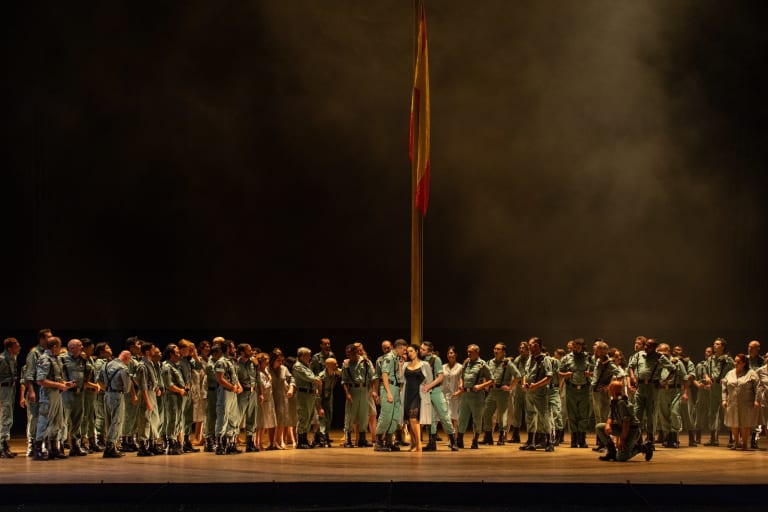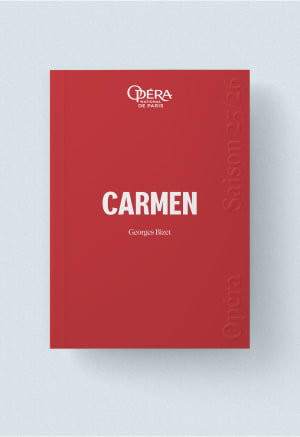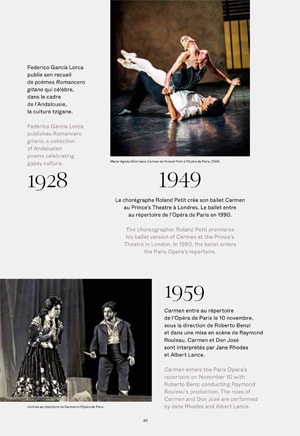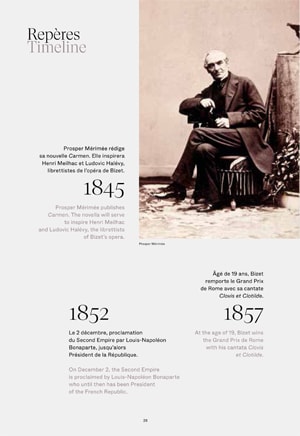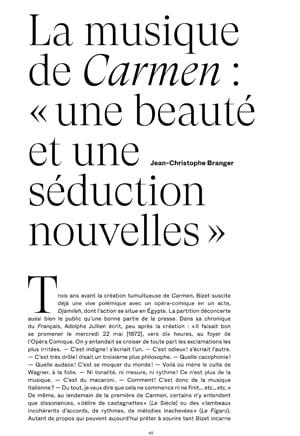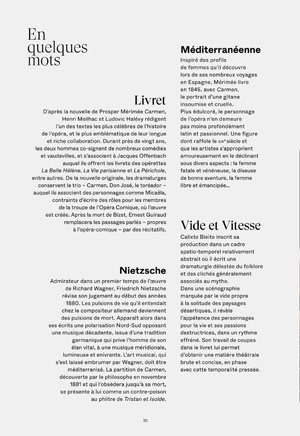Synopsis
Listen to the synopsis
No matter how much she warns them: “If you don’t love me, I love you; if I love you, beware”, Carmen enthralls and enraptures men, making them forget duty and reason. And so it is that a smitten Don José loses his honour for the sake of a flower thrown by a woman who knows no law other than her own desire.
No wonder this fiery gypsy caused a scandal on 3 March 1875, when Carmen premiered at the Opéra-Comique in front of an audience and press shocked by this “Castilian wantonness”. Georges Bizet died three months later aged just 36, never suspecting that his last opera would become one of the most performed in the world.
Eschewing the myth and clichés attached to Carmen, Calixto Bieito delivers a harsh, sensual production in which raw desire is nothing more than the manifestation of a woman’s passion for life, a woman courageous to the point of death.
Duration : 3h00 with 1 interval
Language : French
Surtitle : French / English
Artists
Opera in four acts (1875)
After Prosper Mérimée
Creative team
Cast
The Paris Opera Orchestra and Chorus
Media


Watch online the recording from season 16/17 on Paris Opera Play, with Roberto Alagna, Ildar Abdrazakov, Elīna Garanča, Maria Agresta...
Access and services
Opéra Bastille
Place de la Bastille
75012 Paris
Public transport
Underground Bastille (lignes 1, 5 et 8), Gare de Lyon (RER)
Bus 29, 69, 76, 86, 87, 91, N01, N02, N11, N16
Calculate my route-
Cloakrooms
Free cloakrooms are at your disposal. The comprehensive list of prohibited items is available here.
-
Bars
Reservation of drinks and light refreshments for the intervals is possible online up to 24 hours prior to your visit, or at the bars before each performance.
-
Parking
You can park your car at the Q-Park Opéra Bastille. It is located at 34 rue de Lyon, 75012 Paris.
In both our venues, discounted tickets are sold at the box offices from 30 minutes before the show:
- €35 tickets for under-28s, unemployed people (with documentary proof less than 3 months old) and senior citizens over 65 with non-taxable income (proof of tax exemption for the current year required)
- €70 tickets for senior citizens over 65
Get samples of the operas and ballets at the Paris Opera gift shops: programmes, books, recordings, and also stationery, jewellery, shirts, homeware and honey from Paris Opera.
Opéra Bastille
- Open 1h before performances and until performances end
- Get in from within the theatre’s public areas
- For more information: +33 1 40 01 17 82
Online
Opéra Bastille
Place de la Bastille
75012 Paris
Public transport
Underground Bastille (lignes 1, 5 et 8), Gare de Lyon (RER)
Bus 29, 69, 76, 86, 87, 91, N01, N02, N11, N16
Calculate my route-
Cloakrooms
Free cloakrooms are at your disposal. The comprehensive list of prohibited items is available here.
-
Bars
Reservation of drinks and light refreshments for the intervals is possible online up to 24 hours prior to your visit, or at the bars before each performance.
-
Parking
You can park your car at the Q-Park Opéra Bastille. It is located at 34 rue de Lyon, 75012 Paris.
In both our venues, discounted tickets are sold at the box offices from 30 minutes before the show:
- €35 tickets for under-28s, unemployed people (with documentary proof less than 3 months old) and senior citizens over 65 with non-taxable income (proof of tax exemption for the current year required)
- €70 tickets for senior citizens over 65
Get samples of the operas and ballets at the Paris Opera gift shops: programmes, books, recordings, and also stationery, jewellery, shirts, homeware and honey from Paris Opera.
Opéra Bastille
- Open 1h before performances and until performances end
- Get in from within the theatre’s public areas
- For more information: +33 1 40 01 17 82
Online

Discover opera and ballet in another way

Dive into the Opera world and get insights on opera and pop culture or ballet and cinema. Scan this code to access all the quiz and blindtests on your mobile.

3 min
Carmen
Carmen: the true/false story
A Spanish story of seduction, love and betrayal... The perfect pitch for a telenovela soap opera! What's true, what's false in the following sentences? Find out the truth about Carmen!
DiscoverYou will also like































